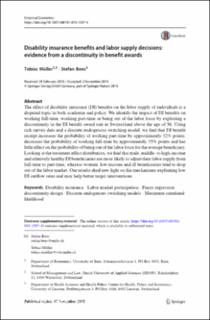Bitte benutzen Sie diese Kennung, um auf die Ressource zu verweisen:
https://doi.org/10.21256/zhaw-3447| Publikationstyp: | Beitrag in wissenschaftlicher Zeitschrift |
| Art der Begutachtung: | Peer review (Publikation) |
| Titel: | Disability insurance benefits and labor supply decisions : evidence from a discontinuity in benefit awards |
| Autor/-in: | Müller, Tobias Boes, Stefan |
| DOI: | 10.21256/zhaw-3447 10.1007/s00181-018-1587-4 |
| Erschienen in: | Empirical Economics |
| Band(Heft): | 2020 |
| Heft: | 58 |
| Seite(n): | 2513 |
| Seiten bis: | 2544 |
| Erscheinungsdatum: | 2018 |
| Verlag / Hrsg. Institution: | Springer |
| ISSN: | 0377-7332 1435-8921 |
| Sprache: | Englisch |
| Schlagwörter: | Disability insurance; Labor market participation; Maximum simulated likelihood |
| Fachgebiet (DDC): | 360: Soziale Probleme und Sozialversicherungen |
| Zusammenfassung: | The effect of disability insurance (DI) benefits on the labor supply of individuals is a disputed topic in both academia and policy. We identify the impact of DI benefits on working full-time, working part-time or being out of the labor force by exploiting a discontinuity in the DI benefit award rate in Switzerland above the age of 56. Using rich survey data and a discrete endogenous switching model, we find that DI benefit receipt increases the probability of working part-time by approximately 32% points, decreases the probability of working full-time by approximately 35% points and has little effect on the probability of being out of the labor force for the average beneficiary. Looking at the treatment effect distribution, we find that male, middle- to high-income and relatively healthy DI beneficiaries are more likely to adjust their labor supply from full-time to part-time, whereas women, low-income and ill beneficiaries tend to drop out of the labor market. Our results shed new light on the mechanisms explaining low DI outflow rates and may help better target interventions. |
| Weitere Angaben: | Erworben im Rahmen der Schweizer Nationallizenzen (http://www.nationallizenzen.ch) |
| URI: | https://digitalcollection.zhaw.ch/handle/11475/13903 |
| Volltext Version: | Publizierte Version |
| Lizenz (gemäss Verlagsvertrag): | Lizenz gemäss Verlagsvertrag |
| Gesperrt bis: | 2023-11-18 |
| Departement: | School of Management and Law |
| Organisationseinheit: | Zentrum für Energie und Umwelt (CEE) |
| Enthalten in den Sammlungen: | Publikationen School of Management and Law |
Dateien zu dieser Ressource:
| Datei | Beschreibung | Größe | Format | |
|---|---|---|---|---|
| Müller-Boes2018_Article_DisabilityInsuranceBenefitsAnd.pdf | 1.01 MB | Adobe PDF |  Öffnen/Anzeigen |
Zur Langanzeige
Müller, T., & Boes, S. (2018). Disability insurance benefits and labor supply decisions : evidence from a discontinuity in benefit awards. Empirical Economics, 2020(58), 2513–2544. https://doi.org/10.21256/zhaw-3447
Müller, T. and Boes, S. (2018) ‘Disability insurance benefits and labor supply decisions : evidence from a discontinuity in benefit awards’, Empirical Economics, 2020(58), pp. 2513–2544. Available at: https://doi.org/10.21256/zhaw-3447.
T. Müller and S. Boes, “Disability insurance benefits and labor supply decisions : evidence from a discontinuity in benefit awards,” Empirical Economics, vol. 2020, no. 58, pp. 2513–2544, 2018, doi: 10.21256/zhaw-3447.
MÜLLER, Tobias und Stefan BOES, 2018. Disability insurance benefits and labor supply decisions : evidence from a discontinuity in benefit awards. Empirical Economics. 2018. Bd. 2020, Nr. 58, S. 2513–2544. DOI 10.21256/zhaw-3447
Müller, Tobias, and Stefan Boes. 2018. “Disability Insurance Benefits and Labor Supply Decisions : Evidence from a Discontinuity in Benefit Awards.” Empirical Economics 2020 (58): 2513–44. https://doi.org/10.21256/zhaw-3447.
Müller, Tobias, and Stefan Boes. “Disability Insurance Benefits and Labor Supply Decisions : Evidence from a Discontinuity in Benefit Awards.” Empirical Economics, vol. 2020, no. 58, 2018, pp. 2513–44, https://doi.org/10.21256/zhaw-3447.
Alle Ressourcen in diesem Repository sind urheberrechtlich geschützt, soweit nicht anderweitig angezeigt.